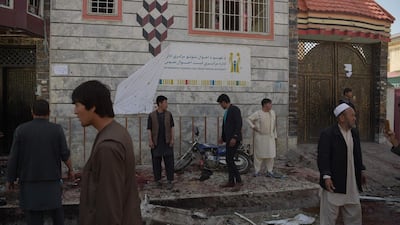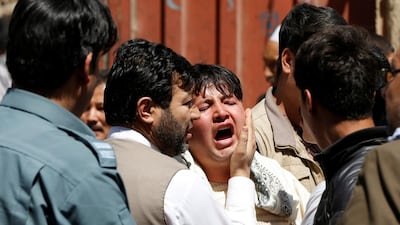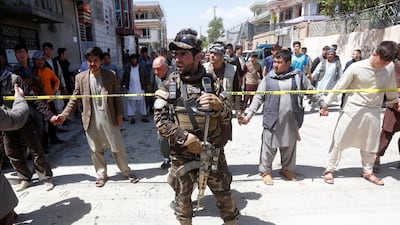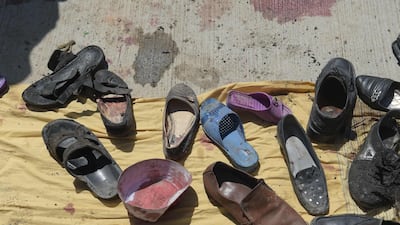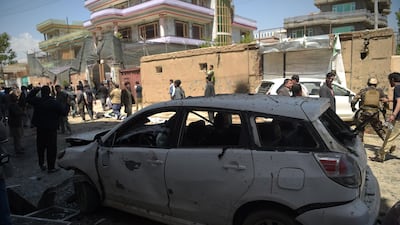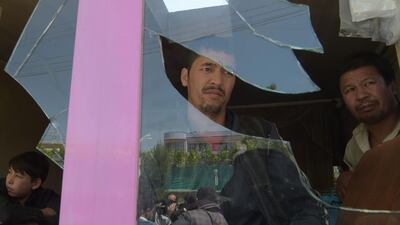A suicide bomb claimed by ISIS ripped through an election registration centre in Kabul on Sunday, killing dozens in what represented the deadliest attack so far on preparations for parliamentary elections scheduled for later this year.
The suicide bomber detonated his explosive vest outside a school in the Dasht-e-Barchi area of Kabul that was serving as a hub for residents to sign up for their national identity cards that would enable them to vote in parliamentary elections slated for October.
The blast killed at least 57 people, including children, and wounded at least 112 more, according to Wahid Majroh, Public Health Ministry spokesperson.
The targeted area is largely populated by the Shia Hazara minority long targeted by militant groups in Afghanistan. Locals described a scene of carnage at the site of the blast.
“I was at home when I heard a loud boom. Because it came from the direction of the school, I ran towards there; my children and nephews were in the school at the time,” recalled Haji Gulam Abbasi, a 50-year-old resident of the neighbourhood who had six young relatives – all aged between 6 and 17 – injured in the attack.
"The bomber had detonated himself very close to the school. I saw over a hundred dead and injured people, many children among them," he told The National as he waited outside the Emergency War and Trauma Hospital in central Kabul.
The father searched for his children and nephews among the dead bodies at the registration centre, but only found one of them. Only at the hospital would he be reunited with the five other relatives who were wounded in the attack.
“I am not sure what state of health any of them are in,” a worried Abbasi told The National.
Fear quickly turned to anger in the Afghan capital. Mohammad Asif, the relative of another wounded victim in the attack – an employee at the registration center – took aim at the government of President Ashraf Ghani.
“My cousin was working for them [the government], to help them hold elections. But they [leaders] are all fine and he is badly injured,” he said, frustrated that not a single Afghan leader had come to see the survivors.
“We are all dying everyday, men, women and children. Why should we vote for them?” he asked.
The attack will give rise to the prospect of further violence in the parliamentary vote later in the year that has already been hampered by delays, but one that Afghanistan’s allies say should take place before a presidential election in 2019.
_______________
Read more:
ISIS claims responsibility for attack on Shiite mosque in Afghanistan
ISIS claims Kabul suicide attack that killed 26
_______________
A second roadside bomb blast struck near a mosque in Pul-e-Khomri, the capital of the northern province of Baghlan yesterday, killing six people including three women and two children. A local official said the blast did not target an election registration centre at a mosque, but a survivor’s account differed.
“We were on our way to a funeral at the mosque when the bomb went off close to our vehicle,” Hussain Ali, one of the survivors told The National in a telephone interview, his voice still quivering. “The mosque is a centre for voting registrations, and bodies of victims are now lying there”.
Ghani condemned both attacks as “heinous”. Security will be a major concern for both him and the Afghan security forces who have struggled to stem the tide of militant attacks since American and NATO forces wrapped up their combat mission in the country in December 2014.
Both the Taliban and ISIS are opposed to democratic elections, and seek a hardline form of Islamic rule in the country. As ISIS has steadily grown its influence in Afghanistan, it now poses as much of a threat as the more established Taliban group that the Western coalition ousted from power in 2001.
The Taliban has been blamed for mounting attacks on the Afghan election process, too. Last week, Taliban-linked gunmen kidnapped three Afghan Independent Election Commission (IEC) employees and two policemen in Ghor Province, central Afghanistan.
Ghani launched the voter registration process on April 14, appealing to the Taliban leadership to participate in the country’s democratic process instead of waging a bloody insurgency. But the militant group responded by rejecting the offer and has since attacked several voting registration centers across the country.
There are more than 7,000 centers that have been established across the country to handle up to 10 million registrations. A total of 47 registration centers have remained closed in the country, mostly in the north, because of the insecurity, according to local media reports.
They Taliban not only refused to join the election process but have called for a boycott of the planned elections. “There is no legitimacy of conducting elections in the presence of thousands of foreign troops in the country,” they said in a statement.
For the long-suffering residents of Kabul, the perpetrator of yesterday’s suicide bomb – be it the Taliban, or ISIS – does not make a difference. They say an attack on the Afghan elections is an attack on the Afghan people.
“They are all the enemies of the people of Afghanistan,” an angry Abbasi responded. “They may go by different names but all of them drink from the same well,” he said.
The greatest damage done by yesterday’s attack may not lie in the damaged streets of west Kabul, but in the country’s voting booths. For Mr Abbasi, he will now reconsider his decision to vote.
“They have now attacked our children,” he continued. “We live in fear of our lives; even when we sleep, we don’t know if we are safe”.
